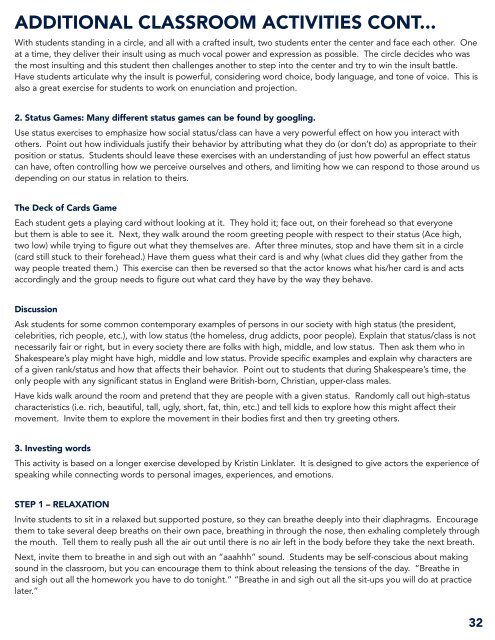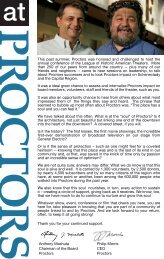SHAKESPEARE: THE REMIX
SHAKESPEARE: THE REMIX
SHAKESPEARE: THE REMIX
You also want an ePaper? Increase the reach of your titles
YUMPU automatically turns print PDFs into web optimized ePapers that Google loves.
ADDITIONAL CLASSROOM ACTIVITIES CONT...<br />
With students standing in a circle, and all with a crafted insult, two students enter the center and face each other. One<br />
at a time, they deliver their insult using as much vocal power and expression as possible. The circle decides who was<br />
the most insulting and this student then challenges another to step into the center and try to win the insult battle.<br />
Have students articulate why the insult is powerful, considering word choice, body language, and tone of voice. This is<br />
also a great exercise for students to work on enunciation and projection.<br />
2. Status Games: Many different status games can be found by googling.<br />
Use status exercises to emphasize how social status/class can have a very powerful effect on how you interact with<br />
others. Point out how individuals justify their behavior by attributing what they do (or don’t do) as appropriate to their<br />
position or status. Students should leave these exercises with an understanding of just how powerful an effect status<br />
can have, often controlling how we perceive ourselves and others, and limiting how we can respond to those around us<br />
depending on our status in relation to theirs.<br />
The Deck of Cards Game<br />
Each student gets a playing card without looking at it. They hold it; face out, on their forehead so that everyone<br />
but them is able to see it. Next, they walk around the room greeting people with respect to their status (Ace high,<br />
two low) while trying to figure out what they themselves are. After three minutes, stop and have them sit in a circle<br />
(card still stuck to their forehead.) Have them guess what their card is and why (what clues did they gather from the<br />
way people treated them.) This exercise can then be reversed so that the actor knows what his/her card is and acts<br />
accordingly and the group needs to figure out what card they have by the way they behave.<br />
Discussion<br />
Ask students for some common contemporary examples of persons in our society with high status (the president,<br />
celebrities, rich people, etc.), with low status (the homeless, drug addicts, poor people). Explain that status/class is not<br />
necessarily fair or right, but in every society there are folks with high, middle, and low status. Then ask them who in<br />
Shakespeare’s play might have high, middle and low status. Provide specific examples and explain why characters are<br />
of a given rank/status and how that affects their behavior. Point out to students that during Shakespeare’s time, the<br />
only people with any significant status in England were British-born, Christian, upper-class males.<br />
Have kids walk around the room and pretend that they are people with a given status. Randomly call out high-status<br />
characteristics (i.e. rich, beautiful, tall, ugly, short, fat, thin, etc.) and tell kids to explore how this might affect their<br />
movement. Invite them to explore the movement in their bodies first and then try greeting others.<br />
3. Investing words<br />
This activity is based on a longer exercise developed by Kristin Linklater. It is designed to give actors the experience of<br />
speaking while connecting words to personal images, experiences, and emotions.<br />
STEP 1 – RELAXATION<br />
Invite students to sit in a relaxed but supported posture, so they can breathe deeply into their diaphragms. Encourage<br />
them to take several deep breaths on their own pace, breathing in through the nose, then exhaling completely through<br />
the mouth. Tell them to really push all the air out until there is no air left in the body before they take the next breath.<br />
Next, invite them to breathe in and sigh out with an “aaahhh” sound. Students may be self-conscious about making<br />
sound in the classroom, but you can encourage them to think about releasing the tensions of the day. “Breathe in<br />
and sigh out all the homework you have to do tonight.” “Breathe in and sigh out all the sit-ups you will do at practice<br />
later.”<br />
32



